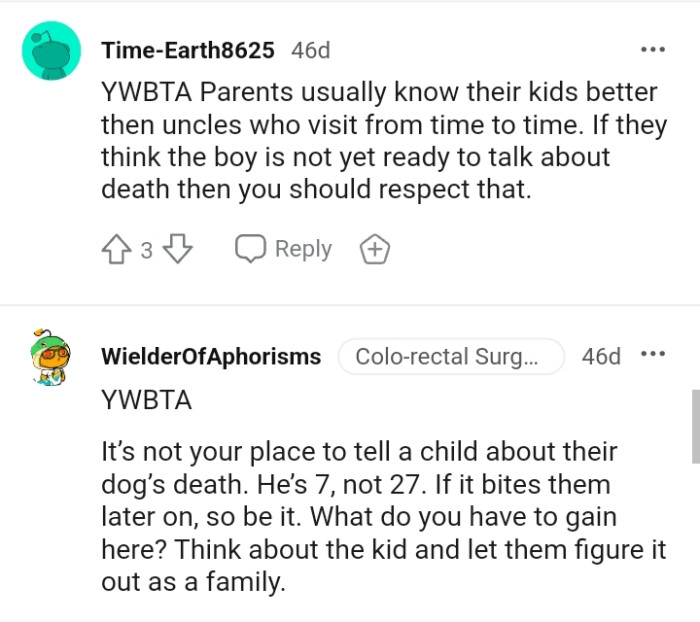Redditor Criticized For Trying To Tell Young Nephew About His Parent's Plan For Putting His Dog Down
You'll agree with me that family pets mean so much more to us than we can imagine. They settle into the home and eventually become members of the family.
Losing a pet can be extremely stressful and heartbreaking, especially for a young child who hasn't yet dealt with any other kind of loss. So yes, a pet's passing might be difficult to accept.
When you don't know how to tell your child that you had to put your dog down, finding the perfect words to use may be difficult, but it's not impossible. Participating in the final choice to put your dog to sleep will benefit your kids.
Depending on their age, your children may or may not be able to be present at the end, but there is still time for them to say goodbye to their pet and cherish the memories of one more embrace. Being present throughout the surgery can help older children calm any anxieties that death won't be painless.
And if your family and your dog are in a cozy and comfortable setting, euthanizing your dog at home significantly reduces stress. However, the OP's sister and brother-in-law were going to put down their dog without telling their 7-year-old son.
They left the kid with the OP, but the OP didn’t want to take part in this plan of lying to him.
Here is the story's headline

The OP doesn’t want to take part in this plan of lying to the nephew that will just make him wait for his dog

OP has offered the following explanation for why they think they might be the a-hole:
I believe I might be an asshole because I am considering going against my sister’s wishes regarding her son/my nephew, when my reasoning might not justify me doing such a thing.
Either the OP respects their wishes or refuses to look after the nephew

The Challenges of Honesty in Sensitive Family Situations
This scenario raises significant questions about honesty and the emotional impact on children in difficult family situations.
Research in developmental psychology indicates that children often benefit from age-appropriate honesty about sensitive topics, as it fosters trust and understanding.
According to studies published in the Journal of Child Psychology and Psychiatry, children who are given honest information tend to develop better emotional regulation skills.
Navigating Difficult Conversations with Children
Talking to children about sensitive topics can be incredibly challenging, especially concerning the death of a pet.
Research in child psychology emphasizes the importance of age-appropriate communication, which can help children process their emotions and understand the situation better.
Effective communication strategies can foster resilience and emotional intelligence in children during tough times.
They can find someone else to watch him if he doesn't want to lie

It would lead to a big mess if the OP talks before letting them know

The OP should refuse the duty if he doesn't want to be part of the lie

Avoiding difficult conversations can lead to feelings of confusion and mistrust in children.
Research indicates that when parents shield children from the realities of life, it can result in a lack of emotional preparedness for future challenges.
Addressing topics like pet loss with sensitivity can help children navigate their feelings more effectively.
Experts suggest that honesty is crucial when discussing difficult topics with children, as they are often more perceptive than adults give them credit for.
According to studies, children who are given truthful explanations about loss are more likely to develop healthy coping mechanisms.
Being open about the situation can help prevent feelings of betrayal or confusion later on.
It's better the OP talks to the sister before making such a decision

It's the boy's parents that have the right to reveal such information

They are denying the boy his chance to say goodbye

The Importance of Age-Appropriate Communication
Communicating about sensitive topics requires careful consideration of the child’s developmental stage.
Studies show that age-appropriate discussions can help children process complex emotions and develop resilience.
Using simple and straightforward language allows children to grasp challenging concepts without feeling overwhelmed.
The Role of Emotional Support in Grief
Providing emotional support during grief is essential for children, as they may struggle with their feelings and understanding of loss.
Research indicates that children benefit from having supportive adults who can validate their emotions and help them navigate their grief.
This support can take many forms, from open conversations to shared rituals to honor the pet's memory.
As long as they're not breaking any laws, they can parent as they like

Think about the kid and let them figure it out as a family

For this Redditor, the OP would not be the AH

Moreover, providing emotional support during these conversations is crucial.
Research indicates that children who feel supported while processing difficult information are better equipped to cope with their emotions.
Parents can create a safe space for children to express their feelings and ask questions, facilitating a healthier emotional response.
Encouraging children to express their feelings about loss can lead to healthier emotional outcomes.
Therapists recommend engaging in activities, such as drawing or storytelling, to help children articulate their emotions.
These creative outlets can provide a safe space for children to explore their feelings and foster healing.
Some Redditors believe that this is just what parents do since they, understandably, don't want their children to realize what is actually going on. Many Redditors agreed that the OP has no right to inform the nephew of whatever his parents have chosen not to tell him.
It's not the OP's place to interfere, and the OP was declared the AH.
Understanding Children's Perspectives on Loss
Children's understanding of loss differs significantly from adults, influenced by their developmental stage.
Research in developmental psychology suggests that younger children may view death as temporary, while older children begin to grasp its permanence.
Recognizing these differences can help adults tailor their conversations to better suit the child's understanding.
Establishing rituals to commemorate the pet can provide children with a sense of closure and help them process their grief.
Creating a memory box or holding a small ceremony can be meaningful ways to honor the pet's life.
These practices can also offer opportunities for family bonding during a difficult time.
Psychological Analysis
This situation underscores the importance of honest and age-appropriate communication when discussing sensitive topics with children.
Providing emotional support and creating rituals can significantly enhance children's understanding and coping mechanisms during times of loss.
Analysis generated by AI
Analysis & Alternative Approaches
Communicating with children about loss requires sensitivity and understanding of their developmental stage.
By fostering open discussions and providing emotional support, adults can help children navigate their grief and develop healthy coping mechanisms.
Ultimately, creating meaningful rituals can enhance the healing process and strengthen family bonds during challenging times.
Coping Strategies for Parents and Children
Developing coping strategies for both parents and children can alleviate the stress associated with difficult family discussions.
Research suggests that engaging in shared activities, such as drawing or storytelling, can help children express their feelings in a non-verbal way.
These activities can foster open communication and create a supportive environment for discussing sensitive topics.
Additionally, seeking guidance from professionals can provide parents with strategies for approaching tough conversations.
Therapists can offer insights into effective communication techniques and support parents in navigating complex family dynamics.
Research indicates that those who seek professional support during challenging times report better coping outcomes for themselves and their children.
Psychological Analysis
This scenario illustrates the complexities of honesty and communication in family dynamics, particularly regarding sensitive topics.
Understanding the importance of age-appropriate discussions can empower parents to navigate these challenges more effectively.
Analysis generated by AI
Analysis & Alternative Approaches
In conclusion, navigating sensitive topics with children requires a thoughtful approach that prioritizes honesty and emotional support.
By fostering open communication and providing age-appropriate information, parents can help children develop resilience in the face of difficult realities.
Ultimately, creating a supportive environment is crucial for emotional growth and understanding in family relationships.



